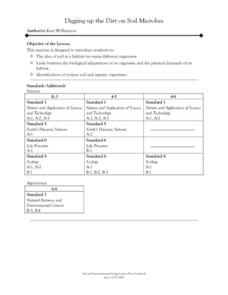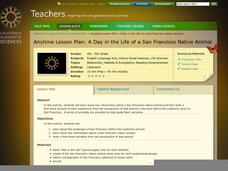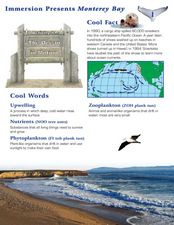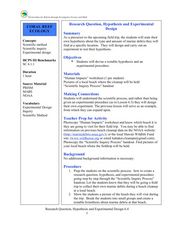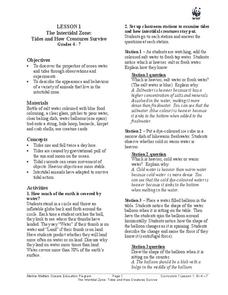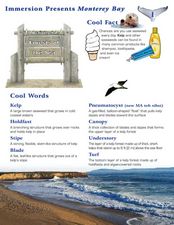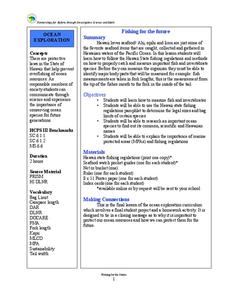NOAA
Watch the Screen!
Can a sponge cure cancer? Life science pupils visit the drugstore under the sea in the fifth lesson of six. Working groups research the topic then get hands-on experience by testing the inhibiting effects of several plant extracts...
Marine Institute
Water Pollution
Sixth graders investigate the various types of pollutants found in water and ways to help prevent water pollution. Through a hands-on experiment, students create samples of polluted water by mixing water with vegetable oil, dirt,...
NOAA
What Killed the Seeds?
Can a coral cure cancer? Take seventh and eighth grade science sleuths to the underwater drugstore for an investigation into emerging pharmaceutical research. The fifth installment in a series of six has classmates research the wealth of...
NOAA
I Can't Breathe!
The Gulf of Mexico dead zone, an area of low oxygen that kills marine life, costs the United States $82 million every year. Young scientists research anoxic ocean environments then come up with a hypothesis for the cause of the Gulf of...
Curated OER
Digging up the Dirt on Soil Microbes
Young scholars are introduced to the idea of soil as a habitat for many different organisms. They are introduced to the links between the biological adaptations of an organism and the physical demands of its habitat. Pupils are...
California Academy of Science
A Day inthe Life of a San Francisco Native Animal
Although the lesson is specifically about the San Francisco Bay area, it's good enough to be adapted to any local region. Children research what the landscape in San Francisco was like prior to settlement, they consider the types of...
California Academy of Science
Fish Prints
What do a dead fish, conservation, and paint have in common? The answer is a great lesson plan about fish anatomy, fun print making techniques, and unsustainable fishing practices. The class will start by making fish prints with a...
Curated OER
Monterey Bay
Young scholars read background information about Monterey Bay, California, and conduct related experiments. In this ocean in motion lesson, students read information about the location, wildlife, and characteristics of Monterey Bay. They...
Curated OER
Diurnal Cycling Experiments
High schoolers carry out an experiment to monitor diurnal fluctuations in dissolved oxygen, carbon dioxide, pH, and water temperature. They determine the CO2 and pH of the samples (and optionally, dissolved oxygen). Students complete...
Curated OER
Research Question, Hypothesis and Experimental Design
Students discuss steps of the scientific process, as well as, observe a picture of the beach that they will visit. Students create a testable hypothesis about marine debris at the beach. In this science lesson, students create a...
Curated OER
The Intertidal Zone: Tides and How Creatures Survive
Students study the properties of ocean water and tides and learn about animals that live in intertidal zones. In this intertidal zone lesson, students participate in classroom stations to learn about fresh water and salt water, cold...
NOAA
Wet Maps
How do oceanographers make maps under water? Junior explorers discover the technologies and processes involved in creating bathymetric maps in part three of a five-part series designed for fifth- and sixth-grade pupils. The lesson...
Curated OER
Forests of the Sea
Young scholars read about and conduct experiments to learn about the vegetation under Monterey Bay. In this Monterey Bay lesson, students read about and look at brightly colored pictures of the different types of seaweed that grows in...
Curated OER
Invasives and Macroinvertebrates
Students view macroinvertebrates, or discuss previous collection activity. They graph data on macroinvertebrates in the Hudson River. Students discuss the relationship between habitat, environmental changes, and invertebrate diversity or...
Rainforest Alliance
Knowing the Essential Elements of a Habitat
To gain insight into the many different types of habitats, individuals must first get to know their own. Here, scholars explore their school environment, draw a map, compare and contrast their surroundings to larger ones. They then...
Curated OER
Ocean Stratigraphy Challenge
Pupils are asked to explain the sequence of rock and sediment types and to devise an experiment to test this hypothesis. It is intended for students with some prior knowledge of oceanography, sedimentary geology, and plate tectonics and...
Curated OER
Diving Raisins
Students hypothesize and observe what occurs when raisins are dropped in a carbonated liquid. They examine buoyancy and how density effects ascent and descent.
Curated OER
Fishing for the Future
Students research Hawaii's fishing regulations. In this conservation lesson, students explore the reasons behind ocean conservation. Resources are provided.




